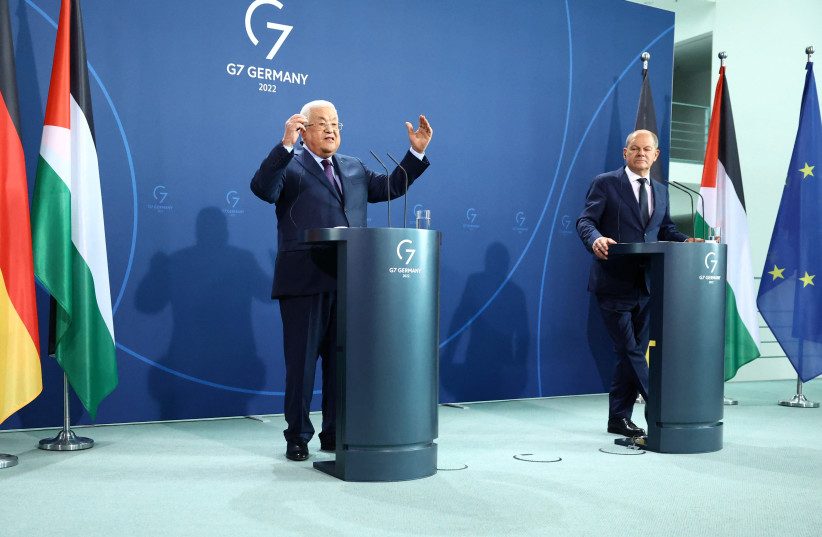Palestinian Authority President Mahmoud Abbas may not be welcome in Germany for some time, following a provocative statement trivializing the Holocaust that he made during a news conference in Berlin with German Chancellor Olaf Scholz.
For more stories from The Media Line go to themedialine.org
Abbas on Tuesday accused Israel of committing “50 holocausts” against the Palestinian people; on Wednesday he amended his statement, saying he was speaking about Israeli “crimes.”
Israel’s ambassador in Berlin, Ron Prosor, told The Media Line that German politicians are “furious with (Abbas) for exploiting the stage he got.”
“From what I see, I doubt Abu Mazen will be invited here again any time soon,” Prosor said, using Abbas’ nom de guerre.
Prosor, who served in several senior positions in Israel’s foreign ministry, is considered one of the country’s most senior diplomats. He emphasized how wide the consensus is among German politicians against Abbas’ statement.

“From what I see, I doubt Abu Mazen will be invited here again any time soon.”
Israel’s ambassador to Germany, Ron Prosor
“I don’t think the Germans ever saw such a response from all the political parties, from left to right, about something,” he said.
Scholz did not comment on Abbas’ statement while standing on stage next to him, but on Wednesday tweeted: “I am disgusted by the outrageous remarks made by Palestinian President Mahmoud Abbas. For us Germans in particular, any trivialization of the singularity of the Holocaust is intolerable and unacceptable. I condemn any attempt to deny the crimes of the Holocaust.”
When asked if Israel had to pressure Germany to criticize Abbas, Prosor said he didn’t have to send a single message.
“Israel wasn’t involved in this at all. The Germans were in complete shock from the first moment. Nobody in the political world is shocked easily, but here they were. And, I must remind, this statement came after he called Israel an apartheid state and refused to apologize for the Munich massacre of the Olympic delegation back in 1972. That already put him on the route to Holocaust denial,” Prosor said.
Did Abbas apologize for the Munich Olympics?
Abbas was asked during Tuesday’s joint press conference if he, as a Palestinian leader, would apologize for the massacre of 11 members of Israel’s delegation to the 1972 Munich Olympics, carried out by the Palestinian Black September terror organization.
“If we want to go over the past, go ahead,” Abbas responded. “I have 50 massacres that were committed by Israel. Which were also recorded in documentaries … 50 massacres, 50 slaughters, 50 holocausts. And to this day, every day we have dead people killed by the Israeli army.” He said the word holocaust in English for emphasis.
A day later, Abbas released a statement offering an apology, which said that “the Holocaust was one of the worst crimes in modern human history, and there was no intention to deny it.”
The apology was published by the official Palestinian WAFA news agency after Israel’s Prime Minister Yair Lapid spoke with Palestinian Authority Civil Affairs Minister Hussein Al-Sheikh by phone, demanding clarification.
The apology ended with: “The crimes President Abbas talked about are the slaughters carried out against the Palestinian people, since the Nakba and that are ongoing until today.” The Nakba, or the catastrophe, is what the Palestinians call the establishment of the State of Israel in 1948.
Munir al-Ghoul, a Palestinian journalist and analyst from Jerusalem, told The Media Line that he does not think the incident in Berlin will affect relations between the Palestinian and Israeli governments.
“There was a lot of pressure coming from Israel, directly from Lapid, to fix the damage. Pressure was also applied from Germany, and possibly from within the PA as well. After the apology was released, both sides can go back to the coordination between them, both in security and civil fields,” he explained.
Israel and the Palestinian Authority coordinate in a variety of areas ranging from matters of everyday life in the West Bank, to intelligence cooperation to fight extremist Islamic terror infrastructures.
Ghoul also said that neither the initial statement nor the apology will change the image of Abbas in the eyes of the Palestinian people.
“The PA has existed for over 30 years, and yet occupation is still here. There are arrests, invasions and crimes against the Palestinian people daily, many of which are coordinated with the PA. A single speech isn’t going to change what people think about President Abbas, for better or worse,” he said.
Abbas’ statement accusing Israel of committing “50 holocausts” on the Palestinian people caused turmoil in Israel’s political landscape.
“Mahmoud Abbas accusing Israel of having committed "50 Holocausts" while standing on German soil is not only a moral disgrace, but a monstrous lie. Six million Jews were murdered in the Holocaust, including one and a half million Jewish children. History will never forgive him,” tweeted Lapid, the son of a Holocaust survivor.
Some Israeli politicians criticized Defense Minister Benny Gantz for meeting Abbas personally and deepening the cooperation with him in recent months.
Interior Minister Ayelet Shaked, for example, tweeted that Abbas “fights IDF soldiers in The Hague, and denies the Holocaust in Germany. He must not be legitimized and certainly not invited to Rosh Ha'ayin,” where Gantz lives and hosted Abbas in December.
Gantz tweeted a response praising the coordination with the Palestinians, adding: “Those who want to bury their heads in the sand and ignore the complex security and political reality are not fit to hold the steering wheel of government and lead the State of Israel.”
In another statement released on Wednesday, Gantz said: “Those who seek peace are expected to acknowledge the past and not to distort reality and rewrite history.”
Nabil Abu Rudeineh, the Palestinian Authority’s presidential spokesperson, did not respond to The Media Line’s request to discuss the topic.
